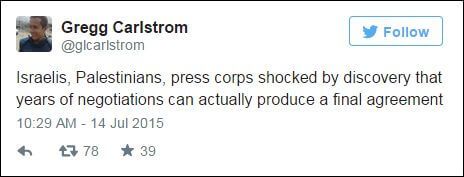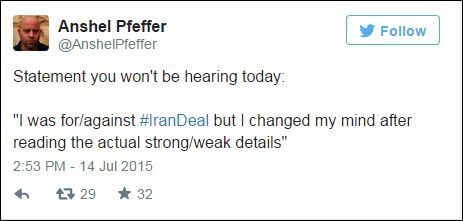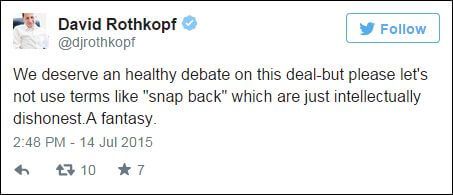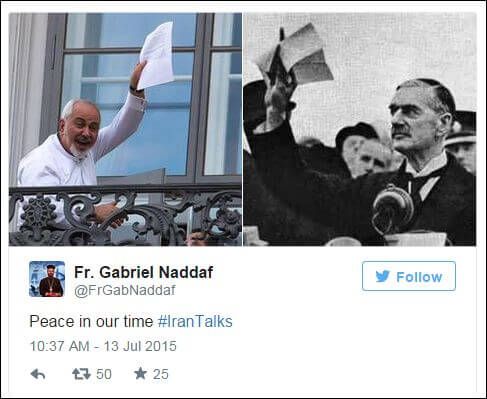Today’s Top Stories
1. International diplomats reached a nuclear agreement with Iran which Israel opposes. See below for a roundup of what’s been disclosed and dissected. The spin games kicked off too. See HonestReporting’s critique: BBC Shocker: “Iran Not a Threat to Israel”.
2. According to Egyptian media reports, several Turkish intelligence operatives in the Sinai were caught while actively helping Islamic State jihadists. The JCPA’s Jacques Neriah assesses the significance.
3. The Whitewash Continues: BBC Trust Refuses to Review Tim Willcox Appeal: Is a “senior editorial adviser” preventing the 12 members of the trust from examining Tim Willcox’s inappropriate reporting?
Iranian Atomic Urgency
• What’s known about the nuclear deal? See key provisions at the New York Times. The biggest stink may regard monitoring Iranian military sites. YNet writes:
According to diplomatic sources, the deal includes a compromise between Washington and Tehran that would allow UN inspectors to press for visits to Iranian military sites as part of their monitoring duties.
But access at will to any site would not necessarily be granted and even if so, could be delayed, a condition that critics of the deal are sure to seize on as possibly giving Tehran time to cover any sign of non-compliance with its commitments.
• Haaretz explains the agreement’s mechanism for snapping back sanctions, should Iran be suspected of cheating.
The 65-day sanction restoration process will work as follows: If a state suspects that Iran has violated the agreement, it will be able to file its complaint with an arbitration board comprising members of the six world powers, the European Union and Iran itself. The committee will have 30 days to decide whether to bring the complaint to the UN Security Council. In that case, the Security Council will have 30 days to vote on whether to restore sanctions, and has the option of extending the deliberations by five days. The Security Council decision will have to be approved by a regular majority, and no countries will have veto right on the matter.
• The White House web site posted its selling points.
• What’s on Russian minds? Out with it, Sergei Lavrov:
Russia says arms deliveries to Iran possible if approved by UN
• Bashar Assad and Hezbollah are happy campers . . .
• Israeli officials speaking out against the deal included Prime Minister Benyamin Netanyahu, cabinet minister Naftali Bennett (on CNN), MKs Michael Oren (Time) and Yair Lapid (Huffington Post), and ambassadors Ron Dermer and Ron Prosor.
• Prime Minister Netanyahu launched a new Twitter feed in Farsi to reach out to the Iranian public. According to YNet:
Netanyahu’s office said it has not decided whether to interact with politicians on the new Twitter feed.
• For early commentary/analysis on the deal see:
– Aaron David Miller: 5 things to watch for in wake of Iran nuclear deal
– Raphael Ahren: With Iran deal in the bag, what’s Israel to do now?
– Bret Stephens: The best arguments for an Iran deal (via Google News)
– Amos Yadlin: Nuclear-hungry Iran is pulling the wool over our eyes
– Herb Keinon: Israeli military option hasn’t vanished
– Jeffrey Goldberg: The single most important question to ask about the Iran deal
– Tom Wilson: Deal risks a nuclear domino effect across Mideast
– Dennis Ross: Outlining concerns with the nuclear deal
– Leon Hadar: Obama chose US interests over Israel ones
– Boaz Bismuth: Zarif laughs as deceit wins
– Stephen Kinzer: A step towards reimagining the Mideast
Israel and the Palestinians
• Just days after he was released, Israeli police briefly detained Palestinian hunger-striker Khader Adnan.
Adnan was detained in the Old City of Jerusalem, where he sought to attend Ramadan prayers, because Israeli restrictions barred Palestinians under 50 from attending, police said.
• Jeremy Corbyn, who is vying for the UK Labor Party leadership, was called onto the carpet over his support for Hamas and Hezbollah. Check out the feisty exchange with Channel 4 News presenter Krishnan Guru-Murthy.
• Memo to the International Business Times and reporter Ludovica Iaccino: Hebron’s Jewish history didn’t start in 1967.
• As Saeb Erekat assumes role of PLO’s Number 2 man, Palestinian officials deny wagging tongues that he is now the favorite to succeed Mahmoud Abbas. More at Maan News.
• India and Israel: A growing romance.
• Vanity Fair takes a closer look at French anti-Semitism through the eyes of a retired French Jewish police commissioner and one of the hostages from in the Hyper Cacher terror attack (who discloses some fascinating details about Amedy Coulibaly).
Commentary/Analysis
• Food for thought: The world’s not interested in the West Bank and Gaza because it’s the safest place in the world for Arabs. Amir Taheri explains:
But there are other reasons the Palestine issue has lost much of its luster for many Arabs. One reason was cited the other evening by a Jordanian businessman, Abu Furas, at a Ramadan fast-breaking dinner in London. “Today, no Arab feels safe in his country,” he said. “Ironically, the sole exceptions are Palestinians in the West Bank because they know Israel will defend them if ISIS attacks. Even in Gaza, most people secretly believe that Israel is their ultimate protection against ISIS fighters trying to strike roots in the Sinai.”
Though the idea of Arabs being saved by Israel from massacre by their own brethren sounds fantastic, events on the ground lend it some weight.
• Here’s what else I’m reading today . . .
– Eitan Haber: No death penalty for terrorists
– Bassam Eid: Gaza one year later: from bad to worse
Featured image: CC BY-SA Tom Woodward via flickr with additions by HonestReporting
For more, see yesterday’s Israel Daily News Stream and join the IDNS on Facebook.





